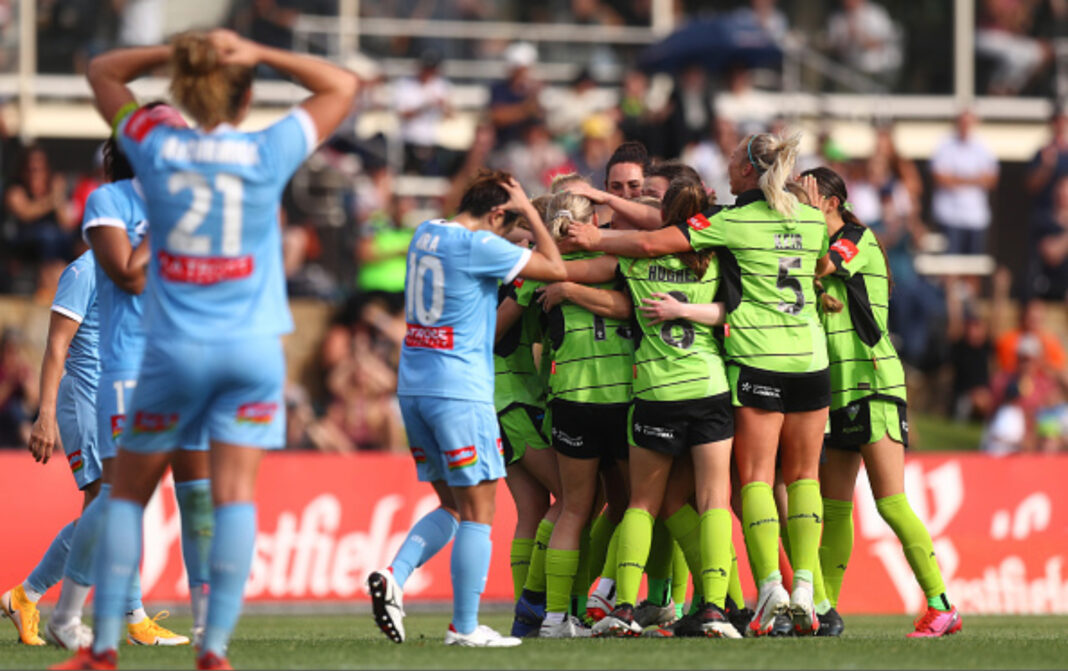

Melbourne City do not need a spin doctor to explain away the 10-goal turnaround between last season’s second Melbourne Derby and the result last weekend.
I was calling the derby at Lakeside in February of last year when City strolled to 4-0 up by the 57th minute. They effectively showed mercy to a Victory team they had completely outclassed by not taking the opportunity to re-write the record books. How sweet it must have been for any Victory players subjected to that humiliation to respond with a 6-0 score on Sunday, inflicting upon City their greatest W-League defeat.
Even as early as the latter home-and-away rounds of last season, before the pandemic, the rumblings were that City’s team of unbeatable Matildas was going to be disassembled with mass departure for Europe. Recruiting didn’t just have to start as soon as the full-time whistle went on the 2019-20 season, but they also had to agree upon a new club philosophy for what they wanted to achieve in the W-League.
I started writing this piece on grand final weekend, then bailed when it became clear the pandemic was going to scupper 2020. But here we are – we have a season and quite simply, City have not handled the aftermath of the Matildas exodus.
Only once you win a lot, does the manner of how you win start to become a consideration. Melbourne City has won a lot, and my great pre-pandemic hope for them would be that they might shift gears and focus on a legacy of more than just trophies.
At the end of last season, 22 uncapped Australian players had taken the field for Melbourne City and none had gone on to win a senior Matildas cap. This transcendent force of W-League football may have given existing Matildas a place to supercharge their careers and a nice shop window to pick their American or European professional destination. However, City had not taken a single uncapped player and turned them into a Matilda. Not one.
This season, that number is up six to 28, with more on the way if squad depth yet to take the field is tested. The uncapped Matilda drought should be broken at one stage or another by Teagan Micah, but with all due respect, one has to be sceptical about the rest.
View this post on Instagram
This City is far closer to an hurried assembly of the talent available, rather than a promising group of youngsters with futures in the senior national team. And the architect of the how-to-blood-youngsters blueprint has ironically already played and defeated Melbourne City this season, Vicki Linton.
Linton’s Melbourne Victory in 2010-11 was on the end of some big scorelines too. 4-1 against Roar, 4-1 and then in the finals 5-1 against Sydney FC. But these scorelines were forgivable because Linton was overseeing the most important single-season campaign in Victoria’s W-League history, as far as it pertains to contribution to the national team.
A quartet of 15 and 16-year-old Junior Matildas were fast-tracked into the Melbourne Victory team and three of them became capped senior Matildas within 18 months.
Linton debuted Brianna Davey and created competition for incumbent Matildas goalkeeper Melissa Barbieri – a competition that Davey ultimately “won” when Barbieri relocated to the Newcastle Jets for the 2011-12 season. Davey would later quit football altogether after falling out with the Matildas coaching group after being omitted from the 2015 World Cup squad, and has since moved to AFLW.
Linton took a 16-year-old Steph Catley who had made two starts the previous campaign and nurtured her path to starter and immediate star. Linton debuted 15-year-old Ash Brown and had her capped by June 2012. Three ACL’s and absolutely no luck later, Brown has retired instead of becoming the Matildas’ on and off-field answer to Alex Morgan.
The fourth player was Caitlin Friend, who was Victory’s all-time top scorer until Natasha Dowie passed the mark. In an imaginary full-time professional W-League, Caitlin Friend is still playing today as a Sarah Walsh-esque forward. What could have been.
Now the cynic might say three out of four didn’t work out, but perhaps that’s reflective of the strike rate and how the net needs to be cast a lot wider and talent needs to be given more opportunities even if they’re not ready to win today. Linton was heavily criticised for playing the quartet of kids ahead of older state league players in 2010-11, even ahead of adult interstate recruits the club had targeted like Snez Veljanovska. But Linton’s legacy to Victorian women’s football speaks for itself. Since the 2012 trio of Catley, Davey and Brown, there have been 21 new Matildas caps. No Victorians.
At the time I interviewed all three players for a The Women’s Game yearbook and wrote about how Brown and Catley were the first Victorian outfielders to play for the Matildas since Selin Kuralay and Tal Karp in 2004. After almost a decade of Melissa Barbieri carrying the torch solo, these kids were supposed to be the drought-breakers that turned the state of Victoria around! Instead, history has repeated and Catley is the new Bubs, the lone contribution from south of the border.
That is why this decade-old trip down memory lane is still relevant. Victoria has a similar class of young talent that is simply not playing, and it would be far easier for City to justify a lop-sided defeat if they were.
In two cycles, with the players about 18 months apart in age, Victoria has produced a crop of Junior Matildas that have been eye-raising in their promise. The seemingly obvious choice to make the Matildas at some point, possibly in time for 2023, is Kyra Cooney-Cross. But Victorian players who shared junior national team spotlight either with or just after Cooney-Cross are not featuring at all. One of these is a Victorian Junior Matildas contemporary of Cooney-Cross’, Jacynta Galabadaarachchi. Galabadaarachchi, currently playing overseas, is Australia’s wildcard and what her future holds is a mystery.
Back to matters in the W-League. First, there are Victoria’s hard luck stories: Sofia Sakalis, ACL. Nia Stamatopoulos, losing this season to compartment syndrome. Grace Taranto, serious foot injuries. Stamatopoulos is potentially Victoria’s answer to Katrina Gorry, Taranto is a defender and potential midfielder highly rated by Victory’s players and national coaches alike, and Sakalis was for a time going step for step with Cooney-Cross before the latter committed to moving to NSW and the Future Matildas program and the former suffered injury in Victoria.
Defender Claudia Mihocic, who played for both the Junior and Young Matildas within a couple of months in 2019, is not making a bench, neither is Paige Zois, who was player of the tournament as 15-year-old at the 2018 national youth championships. Alana Jancevski, a player with all the tools to be a star as shown by the TV show KICK, except the most important – that being a body of work in W-League – is a train-on at Victory, while another 2019 Junior Matilda Alana Murphy is Victory-aligned as well.
Throw in Cooney-Cross and now-20-years-old ACL returnee MelindaJ Barbieri and it seems Victory swept up most of the homegrown youth. 19-year-old striker Maja Markovski, who has made camps but not a junior national squad, waits in the wings for her debut after spending last season at City as a train-on who made the bench as an unused sub once. Even the unfancied-by-the-system Polly Doran, overlooked at every junior state and national representative level, is starting for Victory at 19.
Both Melbourne teams have a responsibility to make sure Kyra Cooney-Cross is not the next Steph Catley, who was the next Melissa Barbieri, as Victoria’s sole name in the Matildas for a prolonged period. Victory are doing their bit by playing potential Victorian Matildas, even if this is while loading up their team with mature-age foreign recruits like Kayla Morrison, Catherine Zimmerman and Annalie Longo, and local veterans like De Vanna, Amy Jackson and naturalised Canadian Natalie Martineau.
Even taking the injuries to Taranto, Stamatopoulos, Sakalis and 20-year-old Albury-Wodonga product Chelsea Blissett into account, imagine if City had gone chips-in on a “Linton 2.0” of Jancevski, Mihocic, Zois and Murphy. Maybe they could have thrown in so-far unused subs 16-year-old Naomi Chinnama, 18-year-old ACL-returnee Lia Muldeary or 18-year-old striker Holly Furphy (Victory-aligned) who made one of Leah Blayney’s Young Matildas camps in 2019.
The homegrown narrative would be far easier to sell than the patchwork of interstate and overseas recruits thrown in with a Victorian contingent whose youngest member to take the field so far is 21-year-old Sarah Cain. In no way should this be a slight on Cain or 25-year-old Julia Sardo, Victorian players who themselves have overcome constant and severe injuries to finally make the W-League. Unfortunately they are at City in this aftermath of the Matildas exodus, a team setting out its stall with no recognised striker, that flattered to deceive through the first two games before the dam broke against Victory.
There are safe and easy lines City can use to explain their start to the season. Players are still arriving, some had to quarantine, the team hasn’t gelled, they need match fitness, you can’t win the title every year. All fair. On the evidence presented around the league, City may yet scrape into fourth, or at the very least right their season with some wins to steer well clear of the table’s lower reaches. But this is a club that has not been shy about setting standards in the W-League. They have made a lot of noise and leveraged a lot of PR and political mileage out of their success. For City, success should have a new definition.
Adopt the Linton approach and City could still say “We’ve done our bit lifting the bar by winning trophies, now we’re going to lift the bar by developing Victoria’s first crop of Matildas in a decade. And we had Kyra for a year as a train-on before Victory signed her anyway!”
But like I said off the top, they don’t need a spin doctor.






